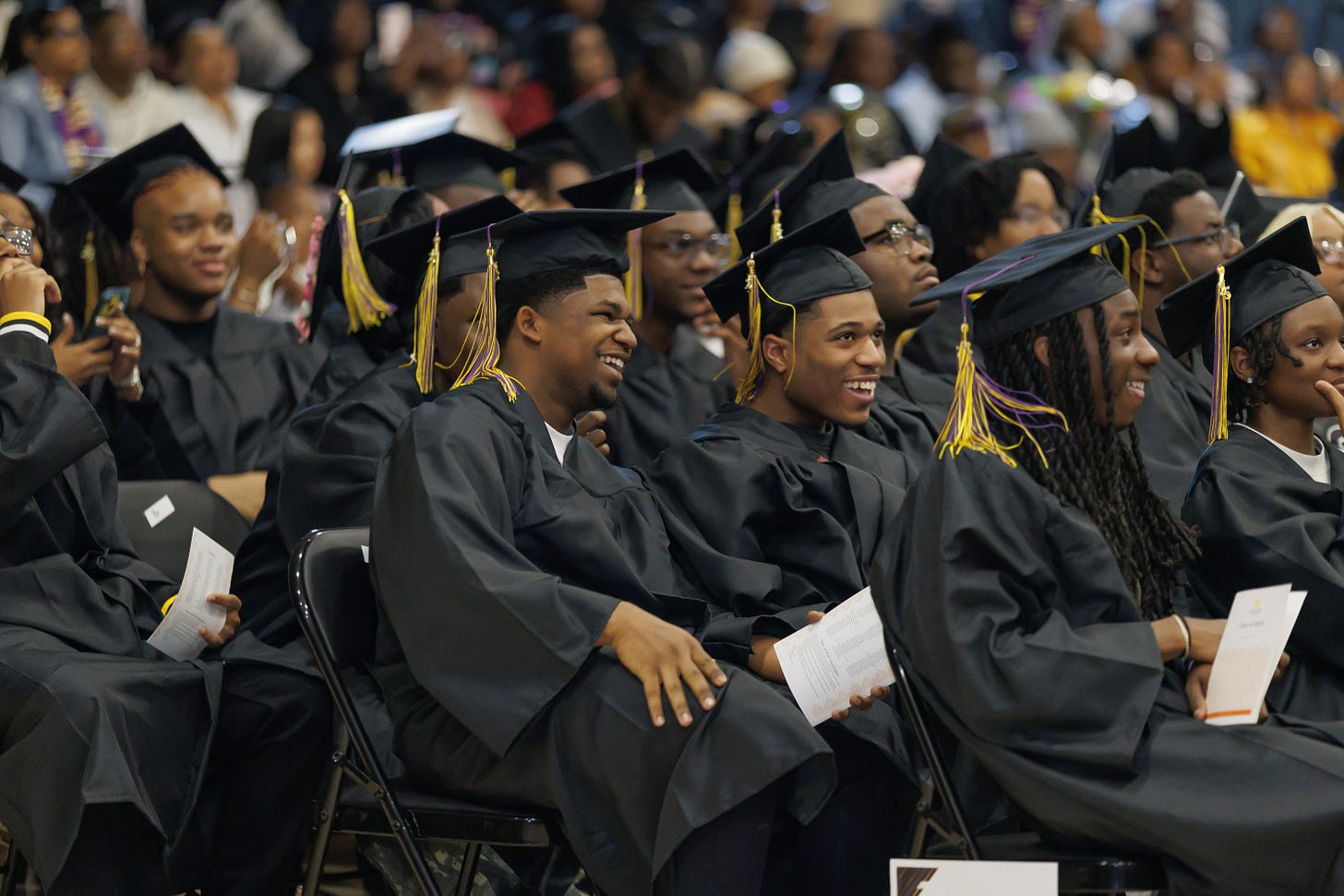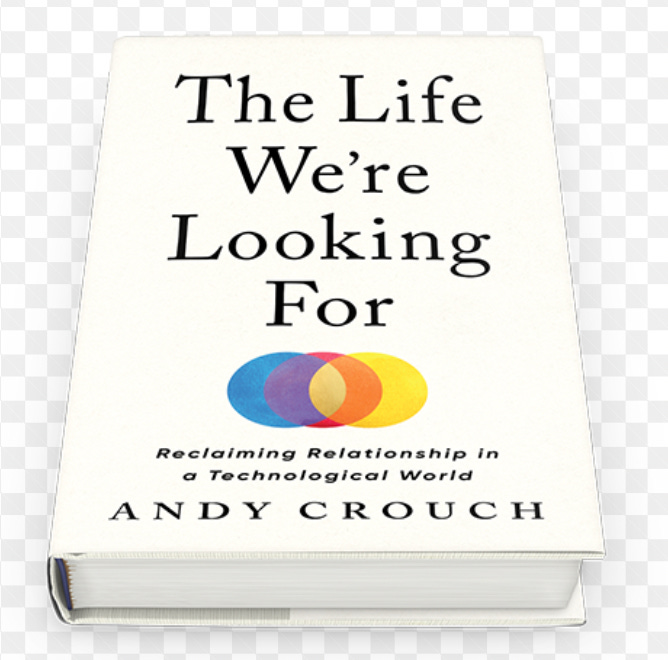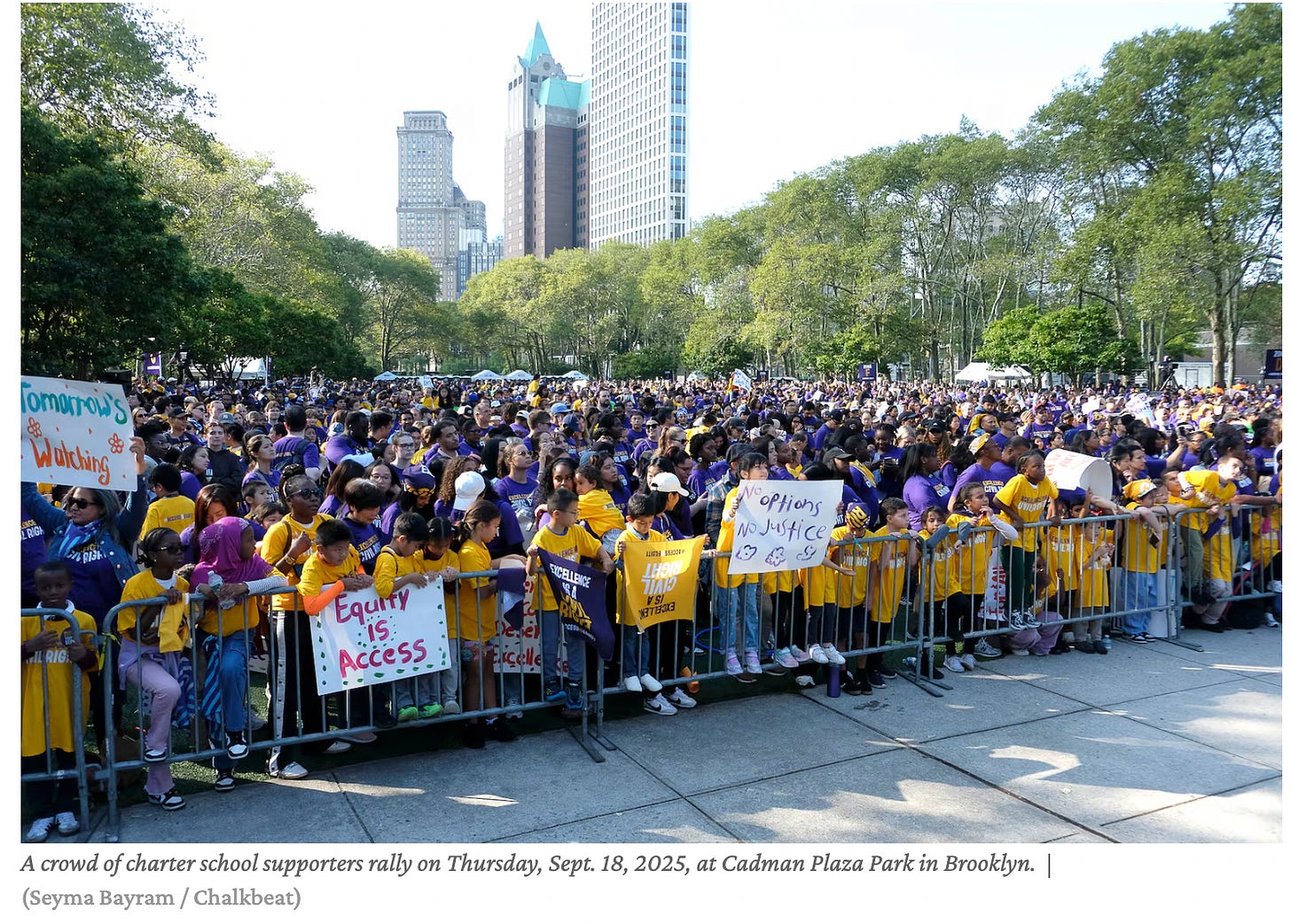On Human Flourishing
What It Is, How We Get It, and What We Have to Give Up to Get There
Every day, educators, school leaders, and brave policymakers are trying to keep the lights on — figuratively and sometimes literally — in a time of unrest, political stalemate, and government shutdowns. They do so because they believe that amid chaos, education can still create order, meaning, and hope.
As author Andy Crouch reminded a new cohort of Yass Prize contenders this week, now is the time for more connection than ever before. Flourishing, he says, doesn’t come from efficiency or technology, but from relationship — from “households” and “canopies of trust” where no one can be missing without everyone noticing.
It made me think: is this what our founders envisioned as we head toward America’s 250th? How do we, as citizens and teachers and parents, communicate about our differences in a world that’s forgotten how to listen?
When Marches Had Meaning
Just days ago, I walked right into a “No Kings” protest in New York City. I stopped and watched, trying to make sense of it. If I were from another planet — or hadn’t watched the news — I wouldn’t have known what they were marching for.
When Dr. Martin Luther King Jr. and thousands of Americans marched from Selma to Montgomery in 1965, it wasn’t chaos or catharsis — it was conviction. Peaceful, purposeful, and anchored in a moral vision larger than any one person, the Selma march embodied the very essence of human flourishing: meaning and purpose, character and virtue. It was about issues, not individuals; about the right to participate in democracy itself.
That same spirit surfaced decades later in another, very different march — when students, parents, and educators crossed the Brooklyn Bridge to demand the right to attend schools that served them. Twice in the past decade, tens of thousands of families from New York City’s public charter schools have filled the streets wearing bright yellow shirts and carrying banners that read “Don’t Steal Possible.” They weren’t attacking anyone — they were defending opportunity. It was a march for something, not against someone.
Both movements — one for civil rights, the other for educational rights — were grounded in what the Harvard Human Flourishing Program defines as the pillars of a good life: meaning and purpose, happiness, character, and virtue. When those elements are missing from public protest or civic engagement, we risk losing the very thing that propels human progress.
Flourishing requires direction. It’s not the noise of a crowd that moves history, but the purpose of its steps.
The Science of Flourishing
The much-cited insights about the primacy of connection in human flourishing aren’t just philosophical — they’re backed by robust, global research. The Human Flourishing Program at Harvard University, founded in 2016, unites scholars across disciplines to answer one question: What makes life go well?
Their flagship Global Flourishing Study, launched with Baylor University and the Institute for the Studies of Religion, includes over 200,000 participants in 22 countries — the largest longitudinal study of its kind. It measures six domains of well-being:
Happiness and life satisfaction
Physical and mental health
Meaning and purpose
Character and virtue
Close social relationships
Financial and material stability
The results are striking: connection — to family, faith, community, and purpose — consistently predicts flourishing more strongly than income, wealth, or academic achievement.
As researcher Tyler J. VanderWeele put it,
“Flourishing is a state in which all aspects of a person’s life are good.”
And as The New York Times summarized Harvard’s research,
“Good relationships keep us happier and healthier. Period.”
Education, the Harvard team notes, is one of the key pathways to flourishing, alongside family, work, and faith. Schools that foster belonging, meaning, and joy may contribute more to lifelong well-being than those focused solely on performance metrics.
Flourishing, then, is not an abstraction. It’s measurable, observable, and deeply human.
The Canopy of Trust
That truth came to life in our recent conversation with Andy Crouch, author of The Life We’re Looking For. Crouch argues that flourishing depends on communities where people are truly known — what he calls “canopies of trust.” In education, that looks like schools as households: places “where no one can be missing without everyone noticing.”
He also reminded us that flourishing isn’t just about happiness; it’s about formation.
“Devices get things done without forming us. Tools form us as we use them.”
His now-famous metaphor captured it perfectly:
“Using AI to do your work is like bringing a forklift to the gym. It lifts the weight for you, but it doesn’t make you strong.”
And perhaps his most powerful reminder:
“If every additional year of schooling reflects less joy, something’s wrong. We should be assessing joy.”
That’s the challenge — and the invitation — for everyone working to transform education today: to restore joy, purpose, and formation to the center of learning.
Technology, Tools, and the Human Touch
This theme runs through the work of the 2025 Yass Prize Contenders — 23 remarkable innovators who will vie for the $1 million prize through an intensive accelerator and final pitch in Miami in November. Each is advancing Sustainable, Transformational, Outstanding, and Permissionless education.
I am hoping they will also help us explore how to strike a balance between what I call Luddite learning and AI-empowered delivery.
To me, the value of AI is in expanding the reach of great content — not replacing it. As several members of our Yass Prize community have written in their recent Forbes essays, AI should enhance the reach of great teachers — supplement, supplant inane tasks, help redefine their role.
Used wisely, AI helps educators meet students where they are, making instruction truly competency-based, something our friends at Axio.ai work hard to make possible. It provides powerful analytics that highlight strengths and learning gaps, customizing instruction more efficiently than traditional models. But it must be built on a foundation of great human teaching, purposeful content, and relationships that make learning stick.
As Crouch argues, like the hammer or the pencil, what we do manually — reading, writing, thinking slowly — builds not just skill but character. If we can find that balance between human formation and AI-fueled delivery, we’ll have the best of both worlds.
These are the challenges we face — and the ones I’m hopeful we can solve as we deploy this year’s Yass Prize Contenders to light up the education world with their incredible diversity of passions, approaches, and ideas.
In the News
We Can’t Afford to Wait to Teach Our Children How to Think — Mike Piscal, College Achieve Public Charter Schools, 2023 Yass Prize Semifinalist
A powerful reminder that teaching thinking — not compliance — is the core of American education.Use AI to Keep Great Teachers in the Classroom - Keeanna Warren, Purdue Polytechnic High Schools, 2022 Yass Prize Semifinalist
How AI can become an ally to teachers, not a replacement.The Economic Power of Teachers — Cornell Ellis, Brothers Liberating Our Communities, 2023 Yass Prize Semifinalist
On the deep connection between identity, representation, and student success.Education’s Special Problem: How Standardized Tests Fail Students Who Learn Differently — By Yours Truly and Team
Why normalizing assessment for students with special needs misses the point — and how connection, not conformity, drives growth.
To Action — and To Flourishing
If we’re to answer the question — What is human flourishing, how do we get it, and what must we give up to reach it? — the answer is as much moral as it is practical.
We must give up our fixation on systems for systems’ sake.
Our dependence on technology for technology’s sake.
Our impulse to say yes to our kids just because everyone else does.
And our habit of letting others do the hard work of thinking through these big questions daily.
We can do better — together.
We’ll be delving into all of this and more at the 2025 Power of Innovation Summit,
December 4th in Washington, DC.
Look for your private invitation soon, or drop me a line to get on the list.
And please send along any thoughts or ideas about how to work across these issues I’ve outlined here today.
Have a great week — and here’s to flourishing, for all of us. - Jeanne




I am encouraged by your article, but I still find the idea of applying such ideas at scale, in an education system built on industrial-era structures and assumptions, to be a daunting task.
How do we find enough teachers and leaders to implement new ideas when they are trained and formed to distrust, or even oppose, such ideas? Where are the preparation pipelines and support networks for these educators? These are big questions!
The power of coincidence continues to strike. Thank you for your article. I had never heard of the Yass Prize which I’ll be entering next year. I’m new to Substack - and as a retired teacher, I create solutions to problems in education. Coming back from a recent trip to Portugal, I came to the conclusion that there is a near impenetrable wall (ironically, my book cover for CAP Notes 2026) surrounded education. Your article has given me hope. I’m currently moving my content from playway.ca and thewaygame.ca to swaycanada@substack.com. Thank you I can’t wait to dive into your article. BTW, you are the first person I’ve written to on Substack.